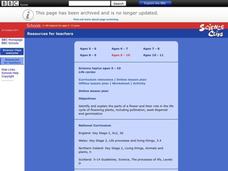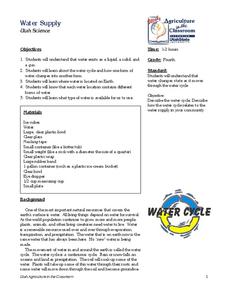Project SMART
Rocks and Minerals: Touch the Earth
Students complete a unit of lessons on rocks and minerals. They conduct research, write e-mail questions to geologists, write daily journal entries, label maps demonstrating types of rocks/minerals found, and create a web page that...
Curated OER
Properties of Rocks
Young scholars compare the properties of rocks. They identify objects made of rocky materials such as walls, sidewalks, etc. Students describe and group rocks based on their characteristics.
Curated OER
Life cycles
Students identify and explain the parts of a flower and their role in the life cycle of flowering plants, including pollination, seed dispersal and germination using the Internet. Students will also study and discuss the key points and...
Curated OER
Earth, Sun and Moon
Students investigate that the sun is at the center of the solar system through role play. One student is the sun and one student is the Earth. The students then show how the Earth orbits around the sun. Students view a flashlight and...
Curated OER
Putting the Pieces Together
Students, in groups, explore ecosystems, water cycle, rock cycle, and food web. They create a puzzle piece on white butcher paper based on their information.
Forest Foundation
Forests, Carbon & Our Climate
To conclude their examination of forest ecosystems, class members consider the role forests play in the carbon cycle and how forests can offset climate change.
Curated OER
Breaking it Down
High schoolers will identify the factors that contribute to erosion and weathering. They will start by differentiating between chemical and mechanical weathering. They then apply what they learned by playing the online jeopardy game. Key...
Curated OER
What Is Natural?
Your junior highers will learn about which objects are natural and classify objects as abiotic or biotic. Your class will trace human products to their natural resources using matter cycles and then create their own definition of nature.
Curated OER
How to Recycle a Rock
Third graders explore the rock cycle and explore how rocks are made, changed, destroyed and recreated. They create representations of these processes with hands-on activities.
Curated OER
Structure of the Earth System
Eighth graders describe the steps in the water cycle. They discuss factors that affect runoff and explain the differences between stalactites and stalagmites. They discover the importance of ground water.
Curated OER
Pangaea Puzzle
Students explore plate tectonics and the formations of the Earth's surface and why maps are distorted. In this Earth's surface lesson plan students complete a lab and answer questions.
Curated OER
Plate Tectonics
Students participate in a series of experiments to learn about plate tectonics and the different materials of the Earth. In this plate tectonics lesson plan, students use eggs, water, beakers, paper, and more materials to learn about the...
Curated OER
Let's Take a Rock Apart
Students take a crushed rock and sort the remains of the rock minerals into different categories based on the different properties. In this sorting lesson plan, students learn what makes up a rock and how to sort something into categories.
Curated OER
Rock Discovery
Fourth graders identify rocks in this discovery lesson by examining rock characteristics and processes. They identify basic properties of minerals and rocks. They revise their theories of the natural world, once they see and learn new...
Curated OER
Water, Water Everywhere
Students study the location of Earth's water and study the water cycle using a terrarium. In this water study instructional activity, students study a model globe for the Earth and find Alaska. Students locate the bodies of water and...
Curated OER
Volcanoes: Kindergarten Lesson Plans and Activities
In the pre-lab, kindergarteners mimic the movements of the eruption of a volcano and discover various volcanoes around the United States. Then, pupils sort different types of volcanic rocks in the lab before learning how volcanoes grow...
Curated OER
Plate Tectonics: Kindergarten Lesson Plans and Activities
This unit focuses primarily on plate tectonics and plate boundaries surrounding continents. It contains pre- and post-lab sections that walk young geologists through plate movements in order to visualize what's going on inside Earth.
Chicago Botanic Garden
Carbon, Greenhouse Gases, and Climate
Climate models mathematically represent the interactions of the atmosphere, oceans, land, sun, surface, and ice. Part two in the series of four lessons looks at the role greenhouse gases play in keeping Earth warm and has participants...
Curated OER
Life Cycles
Students identify and explain the parts of a flower and their role in the life cycle of flowering plants. In this online plant biology lesson, students explore the processes of pollination, seed dispersal, and germination. Extension...
Curated OER
Geology: Famous Rock Groups
Fourth graders, in groups, use books to identify types of rocks. They examine the rocks and complete rock evidence charts. Students compose definitions for each rock type and determine uses for igneous rocks by early mankind.
Curated OER
Rock My World
Students study about the different types of rocks and the rock cycle by visiting different websites and watching a Brain Pop video. They also complete junior geologist training which helped you to determine the meaning of each clue.
Curated OER
Water Supply
Fourth graders complete three activities. In this water supply lesson, 4th graders learn that water can exist in different forms and watch a demonstration of each form. Students explore the water cycle and make a water cycle using the...
Curated OER
'Round and 'Round it Goes!
Students discuss and interpret background knowledge on poster copy given on the water cycle. Students complete the included activity sheets using the poster as a reference in small groups. Students identify and name where water can be...
Curated OER
2nd Grade Physical Sciences
Second graders complete activities to measure motion and learn about the Earth's history. In this motion and Earth history lesson, 2nd graders discuss sound and complete a matching sound activity. Students then study the history of Earth...

























